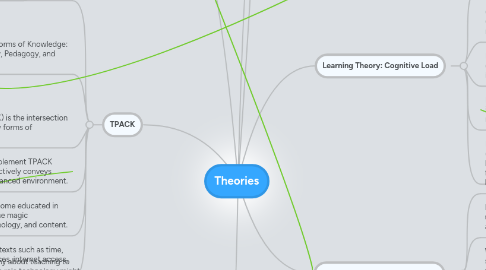Theories
by Shelby Berg

1. Technology Theory: SCOT
1.1. Social Construction of Technology
1.2. Technology does not impact human action, but rather human action shapes technology.
1.3. Looks to the social world to understand the reasons a technology is either accepted or rejected.
1.4. As a methodology, it defines the process to analyze the causes of technological failure or success.
1.5. Core concept of interpretive flexibility states that each technological artifact has different interpretations within different groups. Design flexibility accounts for these differences in interpretations.
1.6. Implies that educational technologies are only as useful as we make them.
2. Technology Theory: Media Ecology
2.1. Many definitions.
2.2. The study of media as environments.
2.3. The idea that technology plays a leading role in human affairs.
2.4. Takes interest in the interactions of technology with human thought, feeling, value, and behavior.
2.5. Implies that technology and media serve as learning environments.
3. TPACK
3.1. Technology Pedagogy and Content Knowledge
3.2. 3 Primary Forms of Knowledge: Technology, Pedagogy, and Content
3.2.1. TPK: Intersection of tecnology and pedagogy knowlege
3.2.2. TCK: Intersection of technology and content knowledge
3.2.3. PCK: Intersection of pedagogy and content knowledge
3.3. TPCK (or TPACK) is the intersection of these primary forms of knowledge.
3.4. Teachers who effectively implement TPACK practice pedagogy that effectively conveys content in a technology-enhanced environment.
3.5. Implies that 21st Century teachers become educated in TPACK and strive towards achieving the magic intersection between pedagogy, technology, and content.
3.6. Exists within contexts such as time, access to resources, internet access, etc.
4. Philosophy of Teachnology
4.1. Stems from a philosophy about teaching to include views about the role technology might play in the learning process.
4.2. Pre-service teachers with a philosophy of teachnology may be able to achieve employment faster.
4.3. Encourages teacher to facilitate learning with technology and teach students to become digital citizens.
4.4. Teachers with a strong philosophy of teachnology are able to intersect their pedagogy and content with educational technologies that enhance the learning process.
5. Learning Theory: Cognitive Load
5.1. There are two kinds of memory: working memory and long-term memory.
5.2. The working memory only holds seven disconnected items at once, and therefore cognitive overload occurs when working memory has too much to process.
5.3. Long-term memory is where storage of schema occurs. Schema are complex patterns of information.
5.4. Learning occurs through the transfer of information from the working memory to long-term memory.
5.5. Implies that educators must take steps to prevent the impairment of learning by cognitive overload. Such steps include the compressing knowledge into meaningful bits, practicing repetition, and creating instructional materials that have a clear design.
6. Learning Theory: Connectivism
6.1. Connectivism is a learning theory for the fast-paced digital age.
6.2. Learning is a process of connecting information sources, and creating useful information patterns.
6.3. Learning resides in non-human appliances such as a network, database, or community.
6.4. Knowing where to find the information is more significant than the information itself.
6.5. Implies that educators must facilitate connections between the students and knowledge.
6.6. Implies that education should become the creation, not consumption of knowledge.
7. Learning Theory: Constructivism
7.1. Learners build new knowledge on the foundation of previous knowledge.
7.2. Learners construct their own knowledge and understanding of the world through experience and reflection.
7.3. When working collaboratively, students bring their own perspectives.
7.4. Learning is active and interactive.
7.5. Educators should provide problem-solving and inquiry-based activities to ensure their students are active participants in their learning.
7.6. Assessment should focus on the process instead of the product.


